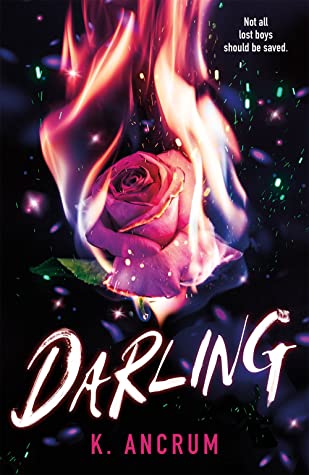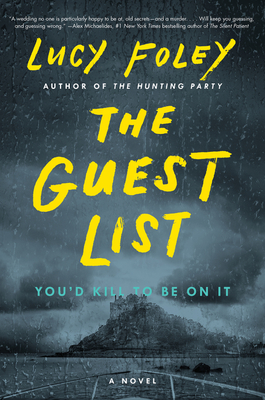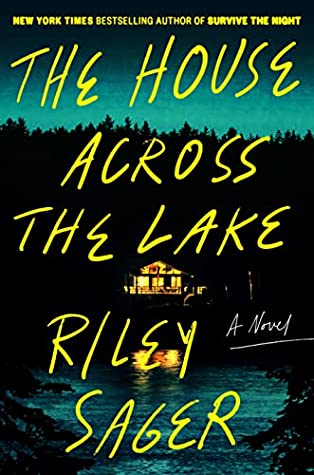
TL; W[on’t]R[ead the review]: A mixed bag. I loved the teen characters so much I want a YA contemporary just about them, but I really disliked the climax and some of the reveals. That makes it a true thriller, in my view.
Content warnings: murder, violence, gaslighting, child predation (non-sexual), police brutality (brief)
Summary [courtesy of Goodreads]: On Wendy Darling’s first night in Chicago, a boy called Peter appears at her window. He’s dizzying, captivating, beautiful—so she agrees to join him for a night on the town. Wendy thinks they’re heading to a party, but instead they’re soon running in the city’s underground. She makes friends—a punk girl named Tinkerbelle and the lost boys Peter watches over. And she makes enemies—the terrifying Detective Hook, and maybe Peter himself, as his sinister secrets start coming to light. Can Wendy find the courage to survive this night—and make sure everyone else does, too?
[Note: This review is based on an eARC from NetGalley and Macmillan Children’s.]
2021 is apparently the year of Peter Pan retellings. Between Aidan Thomas’s more elegiac Lost in the Neverwoods, A. C. Wise’s all-grown-up Wendy, Darling, Cynthia Leitich Smith’s Native-focused MG Sisters of the Neversea, and today’s focus, a straight-up YA thriller, we’re being blessed with a wide spectrum of interpretations of J. M. Barrie’s thematically rich but also deeply racist and problematic text.
K. Ancrum’s Darling deftly remedies the racism (and strict heteronormativity) of the source material, creating a world that’s by turns gorgeously escapist and terrifyingly threatening. Roughly halfway through the book, I was in love with this world and so many of the characters in it. By the two-thirds’ twist, though, I’d begun to fall out of love, and by the end I had the most mixed emotions about this novel that I’ve had about a book in a while. Mostly, this was due to the plot engine and the way Ancrum chose to deal with the threats to main character Wendy and her newfound friends. A lot of thrillers disappoint me in their final acts, so some of this can probably be chalked up to a fundamental genre issue I have, but here it wasn’t just that I could see the twists coming (I couldn’t, exactly) or that the ending was too out-of-left-field (it wasn’t). It was more a series of events that fundamentally broke through my suspension of disbelief and made me question the novel’s political alignment (which I’m sure was unintentional). I’ll go into way more detail in the spoiler territory below, but first, what I LOVED about this book:
Wendy Darling’s growing friend group throughout the book was phenomenal. Each of these teens were so well-developed in spite of getting so little page time for their backgrounds and personalities to come out, and I quickly grew to love them all. First, Wendy’s online-only, proudly lesbian bff Eleanor–her only friend at the beginning of the novel–was so fun, snarky, and loyal. She’s only really featured at the beginning and end, but I’d love a spin-off/sequel where her solid instincts and ride-or-die energy get a prominent role.
HELL, what I really want is a spin-off YA contemporary novel (or series of novels!!) featuring most of the teen characters (and child characters–can’t forget Toodles!) just hanging out, being in love as friends and/or romantic partners, and dealing with all the PTSD all of them have by the end of this book. Think Morgan Roger’s Honey Girl (my favorite book of the year), but YA.
I want more of feisty-but-wounded, tiny Tinkerbelle, more of her budding relationship with brilliant and confident Ominotago (Ancrum’s replacement for Barrie’s racist Native princess), more of Ominotago’s Ojibwe extended family, from her little brother to her “lost boy” cousin to her parents and other family members. I want more time with Ominotago’s teammates, the gentle-but-ripped, and proudly asexual Fyodor, who’s into panromantic flirting, consent, and kissing, and the sweet and strong best friends (and lovers?) Charles and Minsu; and I want more time with the lost boys: brash but tender Curly, Nibs, Slightly, Prentis, and Toodles.
I wanted LESS of Wendy’s parents, though I understand that with YA (and certain plot contrivances), they were a necessary evil. At the beginning of the novel, they were both extremely overprotective and at the same time extremely cavalier with their daughter’s safety. This novel only works if Peter can get into Wendy’s room, and I understand that there needed to be a mechanism for this, but her parents simultaneously forbidding her from visiting Eleanor or leaving the house BUT ALSO being fine with leaving her alone overnight in a bedroom with no lock on its window (when their dog Nana already ripped the clothes off a would-be intruder) was a lot to handle. Cluelessness/character inconsistency for the advancement of the plot is never my favorite. With the discussion of Peter, though, I’ll verge quickly into spoilers, so onto
SPOILER TERRITORY
Oh, man. Peter. I think Acrum did a really great job showcasing both his extreme charisma as well as his toxic and violent control issues and the way everyone around him had to walk on eggshells to avoid setting him off. I appreciated how the character stands as a cautionary tale to teens (or really anyone) about the dangers of a beautiful facade. I also appreciated the realism of the ongoing trauma and anxiety all of the characters around Peter face daily as they attempt to humor and placate him while also trying to live their own lives as best as possible.
It’s not surprising, then (nor I think was it really meant to be), that Peter is revealed to be a violent serial killer. It was even telegraphed at the beginning of the novel, when Wendy’s mother tells her a story about how when she was a girl in the late ‘90s, she partied with a set of boys with a creepy leader and later found out one of the boys had been murdered.
I was expecting the explanation for Peter’s persistent youth to be magic, though, not the much grosser revelation that he just manages to look young for his age and is in fact 36 YEARS OLD! I think I reacted the way Wendy did at that revelation…shudder. So, Peter Pan is a child predator. (Note that while Peter is trying to groom Tinkerbelle, then Ominotago, then Wendy for a ‘mother’ role in his perverse found family, the narrative does take pains to clarify that he never has sex with any of them, nor does he have sex with the lost boys. His sexuality is never a point of discussion, but I do wonder if his ace-seeming qualities are why Ancrum explicitly introduced a kind, heroic ace character into the narrative with Fyodor.)
All of this is fine, and works for the story. It’s also a damn good intervention in the Peter Pan mythos. Where the book lost me, really, was in the apparatus around these reveals, which are mostly provided by Detective Hook (get it??) when the teen crew is in police custody. In the end, this book falls back into the ‘cops save the day’ narrative, which surprised me for a book featuring a self-aware Black main character. At times throughout the novel, Wendy hesitates to approach cops because she knows how those interactions might go, and about a quarter of the way through the novel there’s a seemingly triumphant, violent altercation with the cops in which some of the teens are sprung from zip-ties and cop cars. However, by the end, the reader learns that practically all of the main teen characters have been acting as police informants for months (!!) and are trying to help entrap Peter in the hopes that his arrest will lead to their freedom from his clutches. (I will admit, this part strained my credulity the most, particularly when we learn about the ‘NDAs’ each kid has signed in order to work on the sting.)
And in the end, after Wendy turns informant and wears a wire (giving an uncharacteristically sly performance in the process), police snipers take Peter down (via leg shots), and he’s taken into custody to await trial. The copaganda element of this resolution is slightly undone by the way all of the characters hate the cruel Detective Hook, even as they’re working with him, but I don’t think that’s enough to undo the overall message that relying on this trope sends. Hook really does suck, having gained his prosthetic namesake after he tased a lost boy and Peter beat his hand to a pulp. But, in the end, Hook wins, and that’s supposed to be a good thing. I understand nuance, and I understand moral relativism, but…couldn’t this narrative have worked extra-judicially? Or with some other system in place?
Peter’s exit from the novel comes with the (literal) one-two punch of extra-legal vengeance followed by police brutality: lost boy Curly breaks his jaw with a crowbar, as penalty for the recent murder of his close friend (and, like, fair enough…), but the final act belongs to Hook, who grinds Peter’s jaw with his prosthetic. (“Peter gasped in agony as the metal ground into his flesh, flinching away from the hand he’d made necessary and the grip that he’d earned.”) The novel continues with the teens at the precinct, reuniting with their parents (and ride-or-die Eleanor), and there’s even a very sweet, almost sitcom-y epilogue where we learn that 3 of the lost boys and Tinkerbelle were adopted by Wendy’s family (again, I want THIS continued story) and the others were all safely adopted by other local families. But that violent conclusion stayed with me and left a bad taste in my mouth. I want more, but none of that.
Copaganda rating: High but fraught; cops may suck, but they save the day (with [more than] a little help from some kids)


